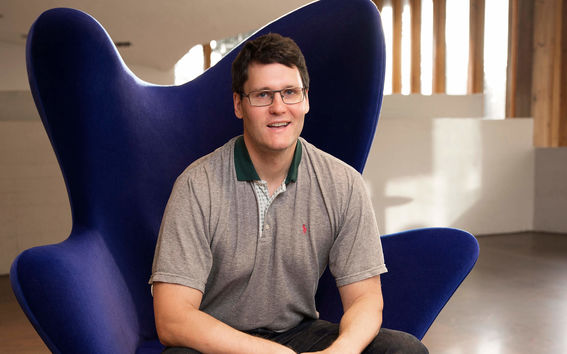Professor Joni Pajarinen believes in the future potential of robots

Robotics is taking giant steps forward with the help of elements of artificial intelligence, believes Joni Pajarinen, who has started work as a professor at the Department of Electrical Engineering and Automation.
What are you researching and why?
I am researching and developing artificial intelligence methods linked specifically with reinforcement learning, which is a form of machine learning. I also study robotics and the linking of artificial intelligence with robotics. I believe that in the future robots will operate more independently and will be capable of functioning in environments in which no robots have been before. Examples include robots that are capable of independently clearing away toys, organising objects in a kitchen, sorting waste, or lifting trunks of trees onto the bed of a lorry. Robot vacuum cleaners are already part of everyday life, but in the future, the job descriptions of robots can expand considerably.
For robots to operate independently in challenging environments, they need to learn how to plan their activities. To be active the robot must compile the information they need to enable them to operate well and to complete the tasks that are assigned to them. In this way, a robot can also operate in environments that haven't necessarily been planned for their use, or which are completely unknown to them. With the help of a method that I have studied, a robot can learn an activity directly from feedback. For example, a robot can learn to untangle objects that are tied up with each other simply by noticing and remembering how the objects can and cannot be moved.
How did you become a researcher?
I have always been interested in methods of artificial intelligence and how things work. I had already graduated with a Master of Science (Technology) and was working in a software company when I got the inspiration to complete postgraduate studies at what was then the Helsinki University of Technology (TKK). Soon after that, I started work on my doctoral thesis in a project which also involved machine learning. After the thesis, I moved over to robotics, because I wanted to develop new methods, and at the same time, to see how they work in the physical world.
What were the high points of your career?
My greatest achievements and high points were the artificial intelligence methods that I developed, which have been more effective than other methods in the same field, and various applications of robotics.
In robotics finding a solution to a new challenging problem that I have been thinking about for a long time has felt especially wonderful. Final solutions are usually simpler than the original report, but they work fine.
What kinds of qualities does a researcher need?
Work in research requires great curiosity, as it involves finding new things and making new observations. Finding new things can be very painstaking and that is why researchers need to be resilient. Research requires quick changes of opinion: it is necessary to be capable of adapting constantly to new situations when expectations do not correspond to reality.
Most researchers are fun and they tell funny jokes, which might stem from the need to be able to examine things from many different angles and to contemplate solutions. Researchers are also capable of functioning well with other people because research work is cooperation.
What are your expectations for the future?
The field is moving ahead very fast both in the development of artificial intelligence and in robotics. In recent times computers have learned to play chess and Go games better than people.
On the other hand, I expect that in robotics, cooperation between people and robots will grow considerably. Steps forward have been taken in the field and it has been shown that robots can operate safely near people. In the longer term, artificial intelligence methods will enable robots to be more independent, and capable of working and learning with people instead of simply carrying out a specific command. The development of robotics can also be seen at our department, where we have a quadruped robot called Spot. Spot climbs stairs, is capable of moving around in difficult terrain, collects information on the environment, and hopefully in the future will manipulate objects. Robotics will also help in the development of autonomous cars which will become more common, especially in simple conditions. These will be seen in the future in people's everyday lives.
The Finnish Center for Artificial Intelligence FCAI is a nationwide competence center on artificial intelligence launched by Aalto University, the University of Helsinki, and the Technical Research Centre of Finland VTT. The goal of FCAI is to develop new types of artificial intelligence that can work with humans in complex environments, and help modernize Finnish industry. FCAI is one of the national flagships of the Academy of Finland. More information fcai.fi
Read more news

Significant donation to boost pavement engineering research and education
Companies and associations in the field have donated €400,000 to the School of Engineering.
‘Mesoscale’ swimmers could pave way for drug delivery robots inside the body
Researchers have discovered how tiny organisms break the laws of physics to swim faster — such secrets of mesoscale physics and fluid dynamics can offer entirely new pathways for engineering and medicine.
Design strengthens industrial competitiveness – human-centered factory work at the core
Factory work is undergoing a transformation: new technologies and artificial intelligence are changing the content and roles of work. Aalto University’s Department of Design is studying this change from a human-centered perspective in the HiFive project.






